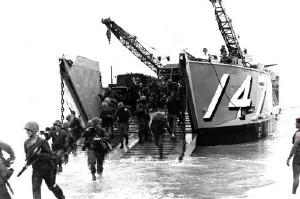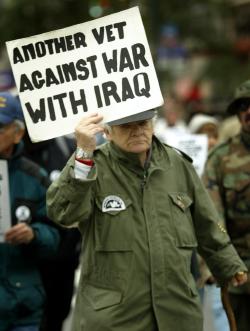Issue Date: January 30, 2004
Today's war on terror parallels failed war on communism in Vietnam By COLMAN McCARTHY Is Iraq Arabic for Vietnam? Politically, tactically and rhetorically, today’s U.S. military presence in Iraq has at least eight major similarities with the Vietnam War -- or, as the Vietnamese called it, the American War. In August 1964, President Lyndon Johnson alleged that a North Vietnamese torpedo boat attacked a U.S. vessel in the Gulf of Tonkin. His secretary of defense, Robert McNamara, said: “While on routine patrol in international waters, the U.S. destroyer Maddox underwent an unprovoked attack.” It was a lie. No torpedoes were fired. The waters were not international; they were territorial to North Vietnam. The U.S. destroyer was on a spying mission, not a routine patrol. Shortly after, Johnson persuaded Congress to pass a resolution giving him power to take action. Out of 535 House and Senate members, only two voted no. Bombing Vietnam began. George W. Bush justified invading Iraq because it brimmed with weapons of mass destruction (false); it was an imminent threat to the United States (false); it had been trying to buy nuclear material from Niger (false); there were links between Iraq and al-Qaeda (false); and victory would be what his neo-con pals were calling “a cakewalk” (false). Vietnam was a war against communism. In Iraq, it’s a war against terrorism. Fighting isms is like chasing a phantom. What is it? Who is it? Where is it? Why is it? The war planners for Vietnam offered the domino theory: Stop communism in Southeast Asia or it will quickly spread to the United States. War planners for Iraq had their dominoes: Stop terrorism in the Middle East or it will infest the United States. Bush said Nov. 16: “We’ll defeat the terrorists in Iraq so we won’t have to defeat them here.” Johnson’s invasion of Vietnam was endorsed by large sections of the U.S. media. In April 1967, the cheerleading saw both The Washington Post and The New York Times criticize Martin Luther King Jr. for a speech in which he condemned the Vietnam War and called the U.S. government “the greatest purveyor of violence in the world today.” Media obeisance to Bush’s invasion of Iraq had not only the nation’s editorial pages bugling their support but also print and broadcast media stars hustling to the Gulf to be embedded with the conquering cakewalkers as they convoyed north to Baghdad.
America’s knowledge of Vietnam’s culture, history, customs, language, literature and religions was nil. Ignorance then about a Buddhist country is matched by ignorance now of an Islamic country with roots in the 7,000-year-old Mesopotamian civilization. Many of the most ardent opponents of the war in Vietnam were combat veterans. April 22, 1971, saw 2,000 demonstrators in a 10-block procession of wounded vets, medal-winners and family members who had lost sons in Vietnam march up Pennsylvania Avenue to the Capitol. The next day, more than 800 vets, including future U.S. Sen. John Kerry, flung their medals and ribbons -- Silver Stars, Bronze Stars, Purple Hearts -- over a 6-foot fence fronting the Capitol. Jack Smith, a leader of Vietnam Veterans Against War, said that each discarded medal was “a symbol of dishonor, shame and inhumanity.” He apologized to the Vietnamese people “whose hearts were broken, not won,” by U.S. acts of “genocide, racism and atrocity.” Soldiers in Iraq or the wounded now in hospital wards have yet to organize their opposition to the war, but their families have. The groups include Military Families Speak Out, Bring Them Home Now and Veterans for Peace. Only one member of Congress had a son who saw combat in Vietnam. No member has a child in Iraq. Lyndon Johnson was in World War II, but managed to stay well away from combat. Bush avoided Vietnam, as did Paul Wolfowitz, as did Dick Cheney, who secured three deferments for himself. The upper-class enclaves of Chevy Chase, La Jolla, Greenwich or Grosse Point weren’t the manpower bases for Vietnam, nor are they for Iraq. Vietnam had no frontlines. The enemy could be a village farmer by day, a Vietcong AK fighter by night. Iraq has no frontlines. Anyone could be a suicide bomber, including, as of late, donkeys. Where is the enemy? Bush claims to know: “Iraq is a front. Turkey is a front. Anywhere the terrorists think they can strike is a front.” Lyndon Johnson vowed to stay the course in Vietnam. On Jan. 12, 1967, he told Congress: “I wish I could report to you that the conflict is almost over. This I cannot do. We face more costs, more loss and more agony. … Our adversary still believes that he can go on fighting longer than we can.” From Donald Rumsfeld on July 14: “Are more people going to be killed? You bet.” That was 12 days after Bush said, “Bring ’em on. We got the force necessary.” Bush on Nov. 16: “We’re not leavin’ till the job is done.” Blustery talk never shapes events, no more than superior military firepower assures staying power. If it did, Vietnam wouldn’t be a communist nation today, and democracy in Iraq wouldn’t be a fuzzy dream. Colman McCarthy, a former Washington Post columnist, directs the Center for Teaching Peace in Washington. National Catholic Reporter, January 30, 2004 |

